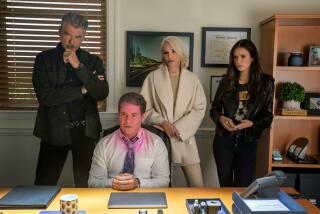Epic, violent conflict
- Share via
Apparently, it didn’t start with Saddam. Who knew?
If you’ve forgotten the day your world history professor buzzed through the Crusades, a brilliant two-part documentary on the History Channel, which premieres Sunday, lays it all out in dramatic style.
“The Crusades: Crescent & the Cross” has it all: fervent religiosity, tangled geopolitics, military maneuvering, a titanic clash between civilizations that unleashed violence and political upheaval throughout the region that still reverberates. The story is a thousand years old and as fresh as today’s headlines.
And there’s more: leaders on both sides of enormous cunning, weapons of mass destruction (arrows that could be launched farther than anyone had imagined), tactical brilliance and tactical stupidity, and enough ruthless ambition to set the known world ablaze.
It started as an effort by Europeans in 1095 to reclaim the Holy Land. It quickly became something else as massive Crusader armies fought with Muslims, Jews and Eastern Orthodox Christians in their quest for Jerusalem. Piety did not preclude savagery.
“Treachery followed by massacre had become the calling card of Crusader armies,” says the narrator, actor Keith David.
For every action, there was an equal reaction. Muslims responded to the Crusader invasion with a word, and a concept, that is as horrific as a suicide car bomb in Baghdad.
“The jihad -- holy war -- is the key element in the armory of Islamic ideology,” says Jonathan Phillips, a Crusades expert at the University of London.
Sprinkled with professorial commentary, “Crusades,” with its reenactments of key battles, has all the action of a Hollywood epic, although you may want to skip the beheadings.
In fact, if you liked “Kingdom of Heaven,” you’ll love “Crusades.” The latter has all the blood-splattered action of the movie but with a deeper look at the clash of the two civilizations. For sheer political maneuvering, it’s hard to beat Pope Urban II, who might just as well have called himself Machiavelli I.
The Europeans were not always a unified force. The Muslims had their own schisms: the Sunnis in Baghdad versus the Shiites in Cairo. Sound familiar?
The Third Crusade in 1191, pitting Richard I of England and his army of 17,000 against Saladin and his pan-Islamic force, is the highpoint of the documentary.
Richard had superior weaponry -- particularly, long-range catapults -- but Saladin’s forces answered with improvised explosive devices. “Crusades” debates whether, at the battle of Acre, Richard was a war criminal or just a ferocious fighter in his treatment of prisoners.
Much of the tale is told by contemporary historians on both sides. Saladin’s death was chronicled by Baha al-Din Ibn Shaddad, a friend and embedded reporter: “The world was overwhelmed by such grief.”
If the Crusades are little remembered in the West, they are a breathing piece of history in the Middle East. In a region with a tendency to fester over past injustices, the brutality of the Crusaders remains a fresh wound, “Crusades” tells us.
“Stories of those Crusades are still told in cafes and in families as if they happened yesterday,” said Tariq Ali, Middle Eastern historian and novelist.
“So whenever the West has ever invaded the region, people say it’s another Crusade.”
*
‘The Crusades: Crescent & the Cross’
Where: The History Channel
When: 9 p.m. Sunday and 9 p.m. Monday
Ratings: TV-PG V (may be unsuitable for young children, with advisory for violence)
Executive producer: Richard Bradley. Executive producer for the History Channel: Susan Werbe. Director and producer: Mark Lewis, Part 1. Director Part 2: Stuart Elliott.
More to Read
Only good movies
Get the Indie Focus newsletter, Mark Olsen's weekly guide to the world of cinema.
You may occasionally receive promotional content from the Los Angeles Times.









